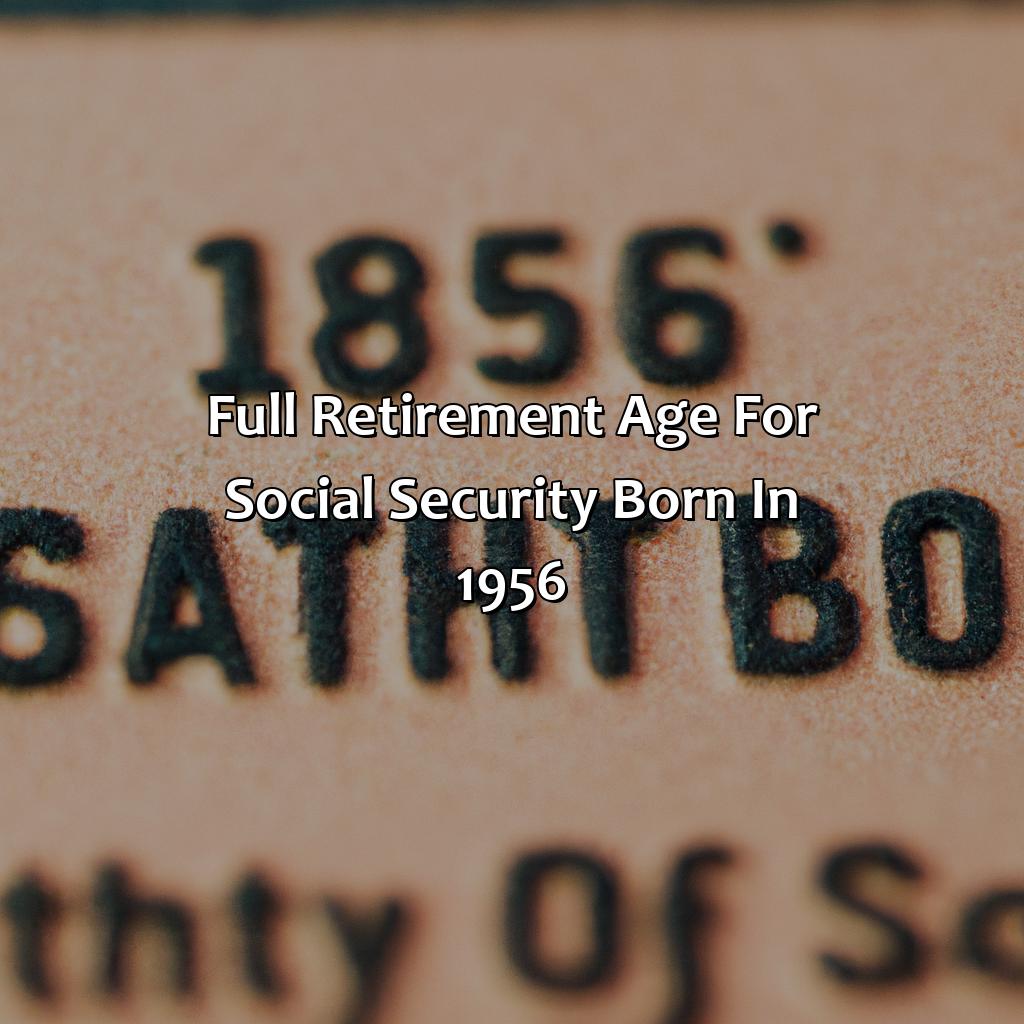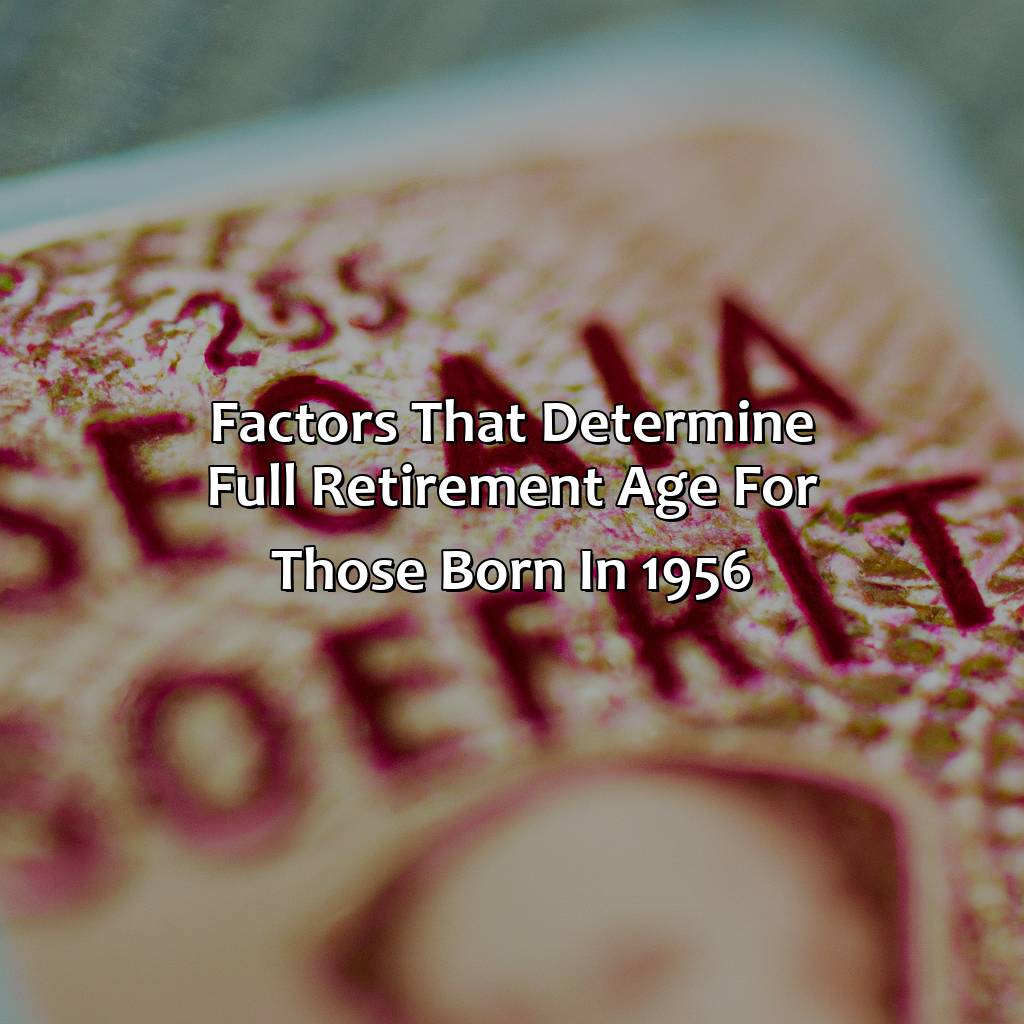What Is Full Retirement Age For Social Security Born In 1956?
Key Takeaway:
- Full Retirement Age (FRA) is the age at which a person is entitled to receive the full amount of Social Security benefits. If you were born in 1956, your FRA is 66 years and four months.
- It’s important to know your FRA to make informed decisions about when to start receiving Social Security benefits. Starting benefits early can result in a lower monthly benefit, while delaying benefits can result in a higher monthly benefit.
- To calculate your full retirement benefits, you need to understand the factors that determine your FRA, such as your birth year. It’s also important to consider the benefits of delayed retirement and early retirement when making decisions about when to start receiving benefits.
Are you curious about Social Security retirement ages and how they apply to you? If you were born in 1956, you may be wondering what your full retirement age is. This article offers a detailed explanation to help you understand your Social Security options.
Full Retirement Age for Social Security Born in 1956
Know your Full Retirement Age for Social Security if you were born in 1956? Understand its definition and why it’s important.
This info can help you determine eligibility for Social Security benefits. Plan your financial future accordingly!

Image credits: retiregenz.com by Joel Woodhock
Definition of Full Retirement Age
Full Retirement Age (FRA) refers to the age at which an individual can access their full Social Security retirement benefit. For those born in 1956, the FRA is 66 years and four months. This means that retirees born in 1956 can claim their full retirement benefits once they reach this specific age. It is important to note that claiming benefits before FRA will reduce the monthly payments and waiting beyond FRA may increase them.
It is crucial to plan for retirement, regardless of your birth year. Individuals can access Social Security calculators provided by the SSA to get a better understanding of how much they may receive when they retire. Some strategies for maximizing benefits include delaying retirement past the FRA, working until later in life, and considering spousal benefits.
There are also penalties for claiming early, such as earning limits and suspension of payment if employment income exceeds a certain limit. Taking these factors into consideration, it is important to make informed decisions about when to claim Social Security benefits to ensure financial stability in retirement.
Knowing your full retirement age is like knowing the expiration date on your milk carton – don’t wait too long to use it or it’ll spoil.
Importance of Knowing Full Retirement Age
Knowing the exact age required for full retirement under Social Security is crucial as it determines the amount of benefits an individual will receive. Understanding the importance of Full Retirement Age enables better financial planning, increased confidence about future finances and avoiding a potential monetary crisis during senior years.
It is recommended that individuals familiarize themselves with the Full Retirement Age early on, to plan accordingly and make informed decisions about their retirement timeline. Having access to this information can also aid in deciding whether or not to continue working after reaching full retirement age.
In addition, it is essential to note that Full Retirement Age varies based on birth year and may affect the eligibility for other benefits such as spousal or survivor’s benefits. Staying aware of these nuances can lead to maximizing Social Security payouts.
To ensure a financially secure future, it’s important to start setting aside money early on instead of relying solely on Social Security. Additional savings such as 401(k) or IRA accounts can supplement retirement income from Social Security. By prudently planning for all options early, one may have more time to maximize their retirement funds, enjoy financial stability and better economic outcomes in later life.
Just like a fine wine, full retirement age for those born in 1956 gets better with age, as it’s determined by a complex blend of factors.
Factors that Determine Full Retirement Age for Those Born in 1956
If you were born in 1956, there are a few things to consider to figure out your full retirement age. Your birth year and full retirement age calculation are important. They help decide when you can get Social Security benefits. Also, early or delayed retirement can change your monthly benefits.

Image credits: retiregenz.com by Yuval Washington
Birth Year and Full Retirement Age Calculation
For Individuals’ Retirement Age Calculation Based on Birth Year
As per the regulations passed by the Social Security Administration (SSA), an individual’s birth year is a crucial factor in determining their full retirement age. This retirement age limit specifies the time when an individual can receive unencumbered social security benefits without any deductions.
To explain this better, we’ve created the following table, which showcases how different birth years determine one’s full retirement age:
| Birth Year | Full Retirement Age |
|---|---|
| 1956 | 66 |
| 1960 | 67 |
| 1965 | 67 and 2 months |
In addition to one’s birth year, various factors such as disability status, spousal benefits applications, and early withdrawals can impact one’s social security payouts. However, understanding your full retirement age based on your birth year is fundamental in creating sound financial plans for your future.
With unexpected life events and financial emergencies always around the corner, it’s beneficial to have a basic understanding of your retirement planning options as soon as possible. So if you were born in 1956 or at another point listed above, be sure to calculate your own scheduled full retirement age by contacting the Social Security Administration or using official online resources available! Don’t miss out on securing adequate support that helps create a fulfilling post-retirement chapter.
Retirement is like a game of chess, sometimes you have to sacrifice your early retirement to secure a better delayed retirement.
Early Retirement and Delayed Retirement
Retiring early or delaying it may affect Social Security benefits. Understanding the implications is crucial for retirement planning. The impact on benefits depends on factors like birth year, work history, and other sources of income.
Early retirement can be tempting, but it reduces monthly payments significantly. Delayed retirement credit accrues after full retirement age, resulting in higher monthly payments after claiming benefits.
It’s essential to analyze individual circumstances before making any decision. Factors such as debt, health expenses, savings, and lifestyle all play a part in determining the appropriate time to retire.
Don’t miss out on maximizing Social Security benefits by making hasty decisions without due analysis and consideration of the many intricacies involved in this decision-making process. Make an informed choice for retirement based on unique personal needs and financial circumstances to ensure complete satisfaction post-retirement.
Ready to do some math? Calculating full retirement benefits is like solving a puzzle, with your bank account as the prize.
How to Calculate Full Retirement Benefits
Have you been born in 1956? Calculating your Social Security retirement benefits? Know about delayed and early retirement – it’s helpful. Delayed retirement = bigger payments, while early retirement = lower payments. Understand the two options – then you can decide when to start getting your Social Security benefits.

Image credits: retiregenz.com by Joel Washington
The Benefits of Delayed Retirement
Procrastinating Retirement provides substantial benefits for retirees.
Undoubtedly, delaying retirement increases the social security benefit amount and ensures a higher standard of living, resulting in greater financial stability and independence in old age. The decision to delay retirement ultimately depends on an individual’s economic needs, but it is often a wise choice.
Delaying retirement past the full retirement age (FRA) results in increased social security payments monthly. For instance, if you delay your retirement by two years beyond FRA, your monthly income will increase 8% per year until you reach seventy (70), known as an 8% delayed-credit increase. Furthermore, retiring late boosts permanent lifetime benefits by up to 132%, emphasizing that putting off claiming social security benefits can be highly rewarding; however, the ultimate decision remains an individual’s specific need for income.
In addition to higher payments, postponing retirement may help you resolve any financial liabilities accrued during your working career. Collectively with better life expectancy rates than their grandparents or great-grandparents enjoyed living longer means needing more cash on hand to cover lifestyles so delaying Social Security is very popular across the generations.
Research indicates that postponing retirement relieves older adults from unpleasant realities such as outliving their savings and economic strain due to health care expenses in old age. Analysis points out that individuals who retire later are less likely to experience depression or mental health problems resulting from a loss of purpose after leaving work life behind. Ultimately delaying gratification pays off well if one prepares adequately for what lies ahead.
Why wait until you’re old and gray to enjoy retirement? Start early and spend your golden years doing what you love.
The Benefits of Early Retirement
Retiring early has its perks, including more leisure time and reduced stress. Early retirement can also mean maximizing full retirement benefits if done strategically. By taking advantage of the available resources and planning appropriately, individuals may enjoy the advantages of early retirement without compromising their social security benefits.
Delaying claiming social security until full retirement age or beyond will boost the value of your monthly payout. The stimulus increases as you delay it, leaving with up to 8% annual bonus after full retirement age. This way, retiring early without losing benefit payouts can be remedied.
However, it’s essential to remember that individual scenarios differ, which is why people need to evaluate their unique situations when considering early retirement. Consider utilizing available online resources for planning in advance of seeking financial advice from professionals specialized in pensions and retirements.
The fear of missing out on comfortable retirements makes sense; thus, retirees seek ways to maximize their social security payouts to live happily ever after whilst they’re no longer working. Be wise while preparing for your future by educating yourself on individual scenarios and employing strategies that will ultimately extend enjoyment during extended old ages.
Get ready to retire like a boss by maximizing your social security benefits with these simple tips.
How to Make the Most of Your Social Security Benefits
Retirement planning? Make the most of your Social Security benefits! Crucial factors to consider when deciding on retirement age. This section is for born-in-1956 retirees. Learn about the benefits of informed decisions regarding retirement age. Consider the important factors. Get the most out of your Social Security benefits!

Image credits: retiregenz.com by Harry Woodhock
Retirement Planning and Social Security Benefits
Retirees can maximize their retirement planning and social security benefits by making informed decisions. Understanding how benefits are determined based on factors such as full retirement age, earnings history, and claiming strategy is crucial to optimize income streams throughout retirement. Choosing the right claiming age, delaying benefits, considering spousal benefits, and working while receiving benefits are all important considerations that need attention.
To determine the full retirement age for Social Security born in 1956, one must consider how many years until they reach age 62. For those born in this year, full retirement age is 66 years and four months; however, claiming early will result in reduced benefits while delaying past full retirement age increases monthly payments.
While considering these factors, it is important to remember that Social Security is just one part of retirement income planning. Those who have limited resources or a short work history may not receive sufficient Social Security income, which highlights the importance of saving through personal investment accounts like 401(k)s or IRAs.
Don’t miss out on maximizing your social security benefits. Start your retirement planning now by consulting with a financial advisor or utilizing online tools provided by the Social Security Administration to estimate earnings and plan appropriately for the future.
Factors to Consider when Deciding on Retirement Age.
When deciding on a retirement age, several factors need consideration. Age, health status, financial situation, and life expectancy are some key elements to keep in mind. It is crucial to plan your retirement goals and estimate the amount of income required post-retirement.
Moreover, it’s essential to consider potential post-retirement expenses like healthcare costs that may affect the retirement decisions you make. Careful calculation planning with an experienced financial planner can help you realize your long-term objectives.
Additionally, weighing options such as continuing work until full social security benefits eligibility versus early retirement with a reduced initial benefit is important. However, if retiring early could cause more significant financial challenges than expected, working past full retirement age might be preferable.
Ultimately there is no one size fits all answer to when or how someone should retire. Every person has unique circumstances that determine their ideal individual retirement age. Discussing a personal plan with an experienced consultant ensures you make informed and adequate choices about your money and lifestyle during your post-employment period.
Some Facts About Full Retirement Age for Social Security Born in 1956:
The full retirement age for social security benefits for individuals born in 1956 is 66 years and four months. (Source: Social Security Administration)
Early retirement is possible at age 62, but benefits will be reduced. (Source: Social Security Administration)
Delaying retirement beyond full retirement age can increase monthly benefits. (Source: Social Security Administration)
Social Security calculates benefits based on the highest 35 years of earnings. (Source: AARP)
It is possible to work and receive social security retirement benefits, but benefits may be reduced if earnings exceed certain limits. (Source: Social Security Administration)
FAQs about What Is Full Retirement Age For Social Security Born In 1956?
What is full retirement age for social security born in 1956?
Full retirement age for social security born in 1956 is 66 years and four months.
Can I collect Social Security retirement benefits before my full retirement age?
Yes, you can start collecting Social Security retirement benefits as early as age 62, but your benefit amount will be reduced if you start collecting before your full retirement age.
When can I collect Social Security retirement benefits after my full retirement age?
You can still collect Social Security retirement benefits after your full retirement age, and your benefit amount will even increase by a certain percentage if you delay collecting until age 70.
Is my full retirement age affected by my birth month in 1956?
No, full retirement age for social security born in 1956 is the same for everyone born in that year, regardless of their birth month.
How is my Social Security retirement benefit amount calculated?
Your Social Security retirement benefit amount is calculated based on your highest 35 years of earnings, adjusted for inflation, and it’s also affected by the age at which you start collecting.
Can I work and still collect Social Security retirement benefits?
Yes, you can work and still collect Social Security retirement benefits, but if you’re under your full retirement age and earn more than a certain limit, your benefit amount will be reduced. Once you reach your full retirement age, there’s no limit on how much you can earn while still collecting your full benefit amount.
 Checkout this IRS Loophole
Checkout this IRS Loophole 



